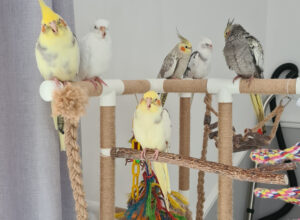Seasonal Cockatiel Care Tips
- Understand the seasonal needs of your cockatiel to ensure its health and happiness year-round.
- Implement season-specific care strategies, from dietary adjustments to environmental modifications.
- Familiarise yourself with common health concerns that may arise with changing seasons.
As a devoted cockatiel owner and enthusiast, I’ve gathered countless hours of hands-on experience and research to bring you comprehensive tips on how to care for your feathered friend throughout the year. The change of seasons brings about different challenges and opportunities for cockatiel care, and being well-prepared can make all the difference. Here are some great tips from experience into how to provide the best care for your cockatiel, tailored to every season.
Cockatiels make wonderful companions. However, they do require attentive care that adjusts with the seasons to maintain their health and happiness. From the warm embrace of summer to the chill of winter, each season brings unique needs and considerations.
Spring
Spring is a time of renewal, but it can also introduce challenges for cockatiel care. As the days get longer and the weather warms, your cockatiel may experience hormonal changes that affect its behavior.
Diet Adjustments: Springtime is ideal for introducing a variety of fresh fruits and vegetables to your cockatiel’s diet, mimicking the abundance of the season. Consider foods that are high in vitamins and minerals to support health and vitality. For guidance on safe fruits and veggies, visit Safe Fruits & Veggies for Cockatiels.
Environmental Changes: Increase daylight exposure to mirror the natural increase in day length, promoting a healthy circadian rhythm. However, ensure that your bird also has access to shade and can retreat from direct sunlight if it becomes too intense.
Summer
Summer offers plenty of sunshine and longer days, but the heat can be taxing for your feathered friend.
Hydration is Key: Ensure your cockatiel has constant access to fresh, clean water. Consider adding a shallow water dish for bathing, which helps them cool off and maintain feather health.
Maintaining a Cool Environment: Keep the cage away from direct sunlight and consider using fans or air conditioning to maintain a comfortable temperature. Avoid drastic temperature changes to prevent stress.
Autumn
Autumn’s cooler temperatures and reduced daylight can impact your cockatiel’s mood and health.
Dietary Considerations: As fresh produce becomes less abundant, supplement your cockatiel’s diet with high-quality pellets and seasonal vegetables. Ensure they’re getting enough vitamins to support their immune system during the colder months.
Preparing for Moulting: Autumn often triggers moulting. Support your cockatiel through this process by providing foods high in protein and ensuring they have plenty of rest. For more on moulting care, see Cockatiel Moulting Care.
Winter
The cold and lack of sunlight in winter can be challenging for both you and your cockatiel.
Warmth and Comfort: Ensure the cage is in a draft-free area and consider covering it at night to retain heat. Monitor the ambient temperature to keep it within a comfortable range for your bird.
Lighting: With shorter days, artificial lighting may be necessary to simulate a longer daylight period, which is crucial for your cockatiel’s well-being.
Year-Round Tips
Daily Cockatiel Care is essential. Regular interaction, cage cleaning, and observation for any signs of illness are fundamental practices that should not be overlooked, regardless of the season. For a comprehensive guide, visit Daily Cockatiel Care.
Cage Placement and Setup: A well-set-up cage can make a significant difference in your cockatiel’s health and happiness. For tips on setting up your cockatiel’s cage, check Setting Up Cockatiel Cage.
Exercise and Play: Regular playtime and exercise are vital for your cockatiel’s physical and mental health, helping prevent boredom and obesity. Find out more about encouraging play and exercise at Importance of Cockatiel Playtime.
Common Health Concerns by Season
| Season | Health Concerns | Preventative Measures |
|---|---|---|
| Spring | Hormonal Behaviour | Provide enrichment and adhere to a stable routine |
| Summer | Overheating | Ensure adequate shade and ventilation |
| Autumn | Moulting Issues | Offer a diet rich in proteins and vitamins |
| Winter | Cold Stress | Keep the environment warm and draft-free |
Final Thoughts
Caring for a cockatiel requires dedication, love, and an understanding of their needs as the seasons change. By adjusting your care approach with the weather, you can ensure your feathered friend remains healthy and happy all year round. Remember, the bond you share with your cockatiel is built on daily care and understanding, transcending the challenges any season may bring.
For more detailed information on cockatiel care, including diet, behavior, and health, visit Essential Cockatiel Care. Your commitment to learning and adapting your care routine will lay the foundation for a long, joyful life together with your cockatiel.

